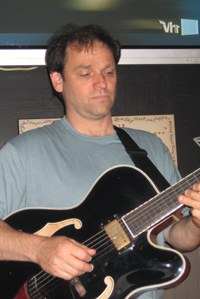Don't see what you're looking for?
Main Site
Berklee.eduCampuses and Schools

Benjamin Sher
For media inquiries, please contact Media Relations
- Three solo recordings on BGI Records
- Leader of Brazilian Jazz group Tudo Bem, which has appeared at the Blue Notes in New York and Fukuoka, and clubs in Moscow, Switzerland, and Germany
- Performances at the Montreaux, North Sea, Istanbul, Marsala, and Bell Atlantic jazz festivals as a sideman with Ute Lemper, Ballin' the Jack
- Recording credits with Ballin' the Jack, Gunther Schuller, Yutaka Uchida, Oswaldo Montenegro, Deborah Latz, and the Boston Jazz Composer's Orchestra
- B.A., Carnegie Mellon University
- M.M., New England Conservatory of Music
"I started picking up Brazilian music by playing and interacting with so many Brazilian musicians at the Drummers' Collective in New York. But in learning the music, I had to organize my understanding of it more than a Brazilian, who plays more intuitively. Brazilian music is less regimented and a little more abstract than Afro-Cuban music. In that sense, it's more like jazz. You can play it in a superficial way, but to get a better handle on it you have to learn the lineage and the history."
"The guitar is a bit of a matrix; because it has so many strings, the same note appears in different regions, so it's hard to figure out where to play notes. To help students find their way around the guitar, I use a streamlined version of Bill Leavitt's 'old-school' approach that I learned from Brazilian music is also helpful in teaching students to read, because the subdivision is in two instead of in four, so I feel students are able to see wider rhythmic phrases and see the bigger picture of what's going on from measure to measure."
"The most important thing I want my students to be able to do is to function in professional music situations. That means being able to sit down with a piece of music in front of you and be able to follow it—to play the melody when needed, improvise when needed, and play the chords in a way that reflects intelligently what's happening with the chords."
"From the perspective of a veteran jazz musician, your ability to hear musical language and respond is your most important skill. I have been very successful as a freelance musician because of my ability to quickly assimilate all aspects of varied musical styles very quickly: harmony, rhythm, and melodic phrasing. In my ear training class we work with music from a variety of musical sources: samba, rhythm and blues, rock, and jazz fusion. We work from an aural perspective using solfege and conducting to develop our musical memory, and also work from our understanding of harmony and notation. Every week we transcribe a tune both in class and as a independent project. As we learn to recognize elements from familiar musical sources, there's dramatic carryover to our ability to sightsing both rhythms and melodies."
Get More Information
By requesting information from Berklee, you will receive emails about our educational programs, student resources, facilities, and more based on your selections.
Thank you for requesting information.
Check your inbox for an email from Berklee. You will start to receive program information, updates, and deadline reminders.
Find the program that's right for you with Berklee's Find Your Program tool.